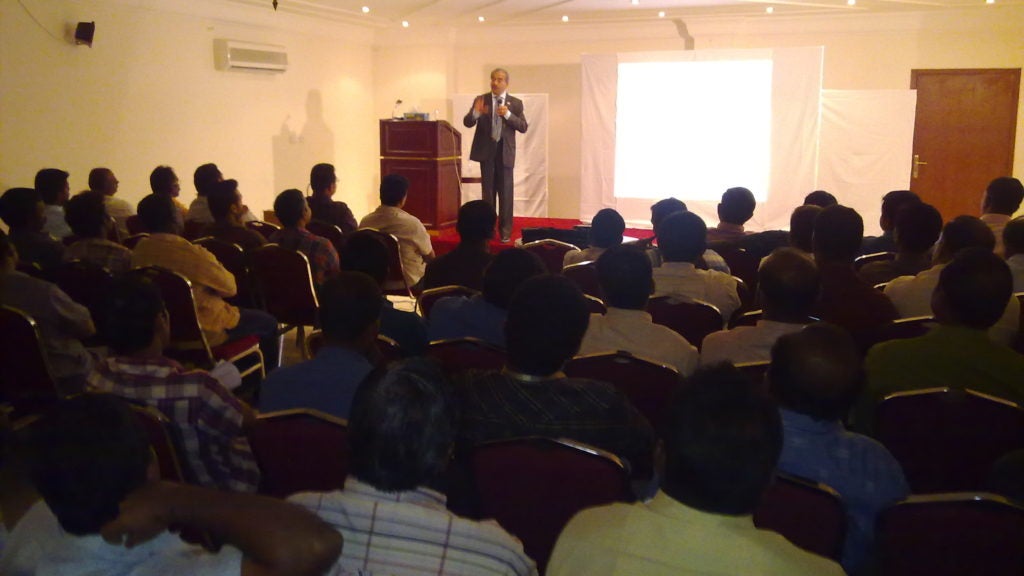Georgetown University SFS-Q Study Finds Strong Impact of Financial Education on Migrant Workers

In direct contrast to their fleeting stay in Qatar, the financial empowerment of migrant laborers in the country can be made enduring once they are equipped with the right education and awareness, a recently-concluded study by Georgetown University School of Foreign Service in Qatar (SFS-Q) shows.
Using a randomized controlled trial approach, the two-year-long groundbreaking research resulting in a paper, ‘Transnational Household Finances: A Field Experiment on the Cross-Border Impact of Financial Education for Migrant Workers’, found out that a one-time financial education workshop offered to a group of married migrant workers whose wives remained behind in India, led to substantial changes in the migrant financial practices and savings goals.
The newfound mindfulness about managing finances also increased workers’ own savings and remittances to their wives as well as spurred joint-financial decision making with their better halves more than a year after the workshop was offered.
“Despite a number of well-intentioned efforts aimed at migrant workers, we have a poor understanding of how effective they are, due to the lack or absence of a carefully constructed evaluation study. Financial education aimed at migrant workers is a potentially important program that can help enhance the financial decision making of migrant households,” said SFS-Q Professor Ganesh Seshan, who co-authored the paper together with Dr. Dean Yang from the University of Michigan.
According to Prof Seshan, who teaches economics at SFS-Q, most migrants to the Gulf arrive with the intention of improving the financial positions of their families. However if they do not plan properly and in particular make good savings decisions, they could end up being no better than what they were before migrating, upon returning home.
“Failure to achieve their financial goals would cause some to migrate again or to extend their stay abroad and prolong periods of separation from family members back home is not without costs,” added Prof Seshan.
Remittances today have become a significant force in the global economy and are considered one of the largest national income sources for many developing countries, often overshadowing international aid and direct foreign investments. However, little research has been undertaken on the subject of migrants’ financial literacy, as only two prior experimental studies on the impact of financial education for transnational households existed anywhere in the world. The SFS-Q research distinguished itself by looking at the impact on both migrant and the household remaining behind in the home country.
For the study, a new dataset was specially collected, which involved more than 200 interviews with a group of migrant workers in Doha from Kerala, the southern state in India, together with their wives back home that was initially conducted between August and December 2010. The financial education workshop was offered in late November 2010. A follow-survey was later administered with the same couples between January and April 2012, with the outcomes examined more than a year after the workshop concluded.
The five-hour workshop was conducted by K.V. Shamshudeen, a social worker who, as a chair of Pravasi Bandhu Welfare Trust, has been working to improve the financial welfare of non-resident Indians in the Gulf for over a decade.
“I was very fortunate to be part of the study funded by Undergraduate Research Experience Program of the Qatar National Research Fund. We had to come up with surveys to find out if workers’ financial situation has gotten any better after conducting workshops on financial management mainly focusing on savings, investments and remittances”, said Jibin Koshy, a recent graduate from SFS-Q, who had been involved in the project since his sophomore year.
SFS-Q involved a total of 10 students in different research capacities from designing survey questionnaires to actual pilot interviews with the subjects in addition to preliminary data analysis over the course of two years.
“I think Georgetown Qatar has been very much involved in the community. I think they go that extra mile to reach out. With so many initiatives in the past that have an obvious social and economic impact, the University has shown us that there’s a larger community outside of the class that can benefit from our involvement,” added Koshy.
In terms of future research activities, there are plans to study the impact of offering financial education to a larger migrant audience including those from other countries. “We welcome the collaboration of interested parties which will help make these initiatives sustainable”, said Prof Seshan